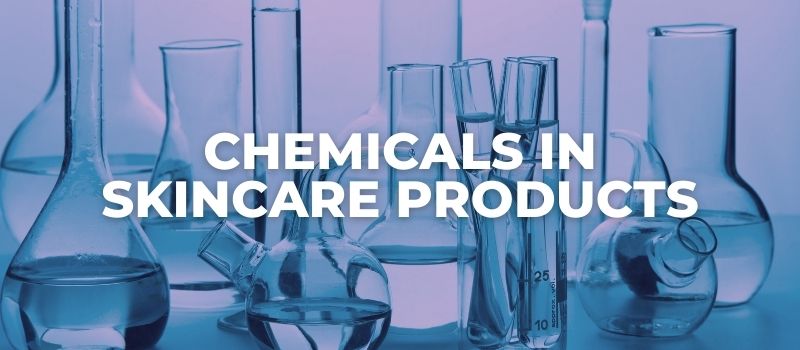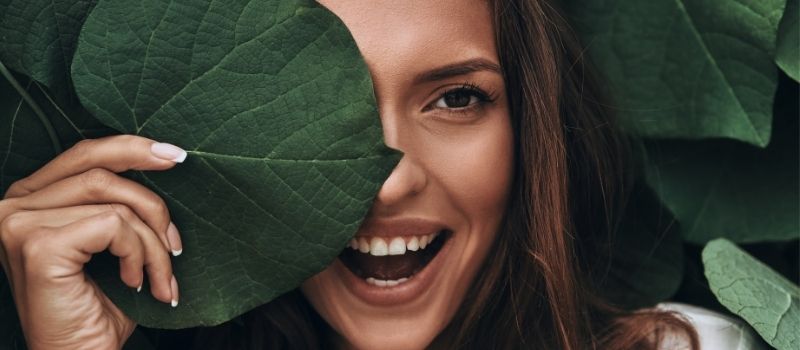There is nothing like a little bit of controversy in order to generate some media buzz and draw attention towards the message many companies are trying to spread.
For over a decade there have been recurring reports in both the media and on hundreds of internet sites relating to potentially toxic substances present in cosmetics and the dangers they pose to the consumers.
But are chemicals in skincare bad?
Should we really be worried about this or is it all just scaremongering and a desperate cry for attention?
This is what I will be answering in this quick article below.

How Are Chemicals Used in Skincare?
There are many chemical combinations used for the preparation of beauty products. The chemicals added are responsible for the texture, scent, feel, and color of the products.
Cosmetics are made from a range of ingredients which are called industrial chemicals. Sounds scary, right?
However, industrial chemicals may be either synthetic or naturally occurring processed chemicals, which makes it sound slightly less scary.
Moreover, these ingredients can easily be researched online by their names and, as it turns out, many of them are simply labeled as toxic and non-safe, but this is entirely false from a scientific point of view.
Both dermatology and toxicology experts agree that based on current knowledge, cosmetic ingredients in today’s market are completely safe to use as directed.
The reason for this is that chemicals in skincare products are used in very small and diluted quantities.
Cosmetic products are defined by their temporary effects and inability to change the physiology of our body and moreover, very little of these ingredients actually penetrates the outer layer of the skin.
This means that chemicals used in skincare products simply cannot penetrate deep enough to enter the bloodstream and cause any type of harm.
Moreover, many warnings also relate to the effects of large doses of chemicals on lab animals, typically rats, mice, and rabbits, which aren’t a reliable prediction of the effects small and diluted quantities will have on humans.
For example, substances that cause cancer in mice don’t necessarily cause it in rabbits and vice versa.
Therefore, in the absence of good evidence of harm, it is up to you to decide whether you want to continue buying products that contain these ingredients or not.
Is Natural Skincare Good (Better)?

Many people nowadays wary of “chemical” skincare products and gravitate towards natural cosmetics, assuming they might be safer, healthier, and better.
Words like hormone disruptors, phthalates, birth defects, cancer concerns, etc, are being thrown around almost forcefully in order to scare people into buying in on the entire “natural skincare” trend.
But natural cosmetics may not always be a better choice for you, and you can see why I think most homemade skincare is a scam here.
Many natural ingredients can cause skin reactions, hypersensitivity, and allergies, including lavender, tea tree oil, lanolin, cinnamon, citrus oils, and other various essential oils that are slapped on every “clean beauty” product as a natural alternative to fragrance.
In fact, some oils including lavender and tea tree have already been linked with hormone disruption in boys.
Additionally. people can even develop potentially harmful food allergies after having their skin sensitized to ingredients found in “natural cosmetics”.
There have been various reports of people who have developed food allergies after using skincare products containing almond oil, peanut, wheat, and even oats.
Natural products used to be sold primarily in health food stores and farmers’ markets with labels decorated with pictures of trees, grass, or leaves, making the consumer believe they came straight from mother nature.
But is this really something you consider safe?
Nowadays, sleek new brands are positioning themselves as cleaner alternatives to the mainstream chemical-based and “harmful” skincare products.
What seems to be happening here is a classic sabotaging and even bullying of mainstream skincare brands, deeming them toxic and non-safe in order to bring attention to their cleaner alternative.
Or as I like to call it…
They feed you with a fake problem so they can sell you the solution.
Chemicals in skincare are safe and work incredibly well when used with the right formulas and at the right doses.
This is why you should trust the science when it comes to skincare products and avoid coming up with your own DIY skincare as the latter could be even more dangerous, even though it’s “natural”.

My name is Simone and I am a certified skin specialist. I created this website to teach my readers how to take great care of their skin and I also like to occasionally share my honest opinions on skincare products I’ve tried. You can learn more about me here.
